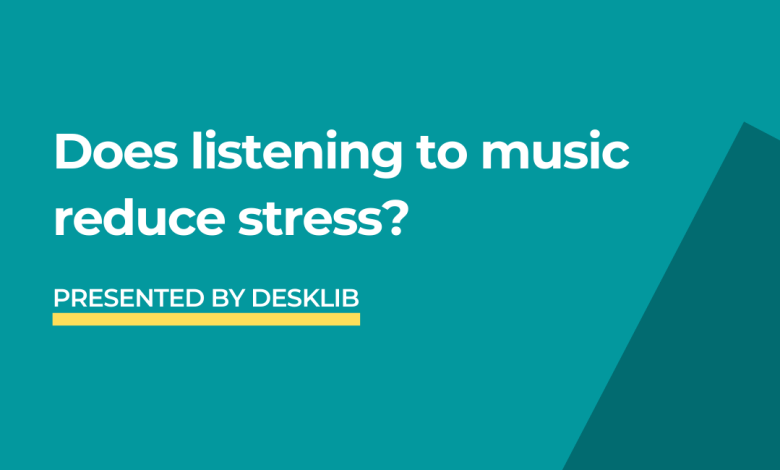Stress: Does Listening To Music Reduce it?

The emotional and physical effects of music are profound. Music that moves faster can give you a more alert feeling and make you concentrate better. A positive attitude can be boosted by upbeat music. You can feel soothed while releasing stress by listening to a slower tempo, which can calm your mind and relax your muscles and ultimately, reduce stress. Music has a calming effect on the mind and body.
This has been proved by research. Researchers have found that music at 60 beats per minute may cause the brain to sync with the beat, resulting in alpha brainwaves (frequency between 8 and 14 hertz). During a relaxed and mindful state, the alpha brainwave is present.
A person may need to listen to calming music for at least 45 minutes in order to induce sleep (a delta brainwave of 5 hertz). “Listening to music appears to be able to alter brain functions at the same level as medication,” noted Stanford researchers.
You may find other musical suggestions by consulting the Counseling Service staff or by searching the internet. You should keep in mind that quieting your mind does not automatically translate into feeling sleepy. As a result, your brain and body are relaxed, and you can then perform well in a variety of activities due to your new calm self.
Also Read: What Type of Doctor Should I See for Weight Loss?
How Can Listening To Music Reduce Stress?
Stress — the feeling of being emotionally stressed, overwhelmed, or unable to cope — affects us physically and mentally.
As a result of stress, your brain is activated in certain ways by hormones and chemicals your body releases. During high levels of stress, for instance, our heart rate and blood pressure go up, and our adrenal glands begin producing cortisol, also known as “the stress hormone.”
In every era and location, music has proven to be an effective stress reliever. Listening to your favorite music of any genre, regardless of its genre, can also have calming effects, as have certain types of music, such as classical and ambient.
Listening to music can help reduce stress, according to a 2022 review of music and stress research:
- It reduces stress hormones cortisol and heart rate.
- It releases endorphins and makes us feel better.
- Reducing stress by distracting us
- In a clinical setting or in everyday life, reduce stress-related symptoms
Music as meditation can reduce stress
- In many religions and types of yoga, meditation is an essential element of practice. Mediation is a worldwide practice.
- Meditation usually involves focusing, calming, or centering the mind. Additionally, it can assist in relaxing the body. This makes it an excellent accompaniment to music for some people.
- Meditation music usually has a slow tempo, which lowers stress levels and heart rates, as well as anxiety levels. Music and a narrator guide you in guided meditation, and you can listen to positive affirmations or direct your energy flow.
Music to reduce anxiety
- Pain, anxiety, and stress tend to hang out together. It is possible to manage them by listening to music.
- Research shows that music can be helpful in reducing anxiety before and during medical procedures for both adults and children.
- In one study trusted Source the researchers found that over 950 critically ill patients who received music therapy for 30 minutes per day had lower rates of anxiety and stress. Anxiety can also be reduced by music’s ability to decrease biological response to stress, such as heart rate and cortisol levels.
Music maximizes relaxation and minimize stress
Music can be used to reduce stress and to promote relaxation, particularly when it is classical music. As the pulse and heart rate are slowed down by this slow and quiet genre, it has an effect on physiological functions.
When classical music is heard, blood pressure, stress hormones, and even heart rate can be decreased. Managing the common stresses we face in our everyday lives becomes easier with this type of relaxation.
Distractions provided by music
There are times when you need a distraction from your worries. It can be useful to provide distractions through music since it absorbs attention and diverts focus.
As music can help to keep your mind from wandering and to relax, it can be a great addition to meditation. Everyone has a different way that music affects them, so we will all choose music differently. We will also choose music depending on our mood.
You can increase your productivity by reducing stress
Speaking of music as a distraction, it can also be used as a tool for increasing productivity. Confusing, right?
Faster music can help you to feel more alert and help to increase productivity. More upbeat music can also help you to feel more optimistic and help you to better maintain a positive mindset.
You might feel like it makes sense to try to stay away from listening to music when you are stressed. Listening to music is a great way to reduce stress and increase productivity, or at least can assist you in this direction.
Music can have a calming effect on sleep
Stress often causes people to lose sleep. As music can influence physical, psychological, and emotional states, which contribute to the success of sleep, it is beneficial to generating sleep. You will find it much more difficult to fall asleep if you are too alert or excited before bedtime.
You can wind down and relax before going to sleep by listening to soothing music. By decreasing the number of wake-ups during the night, the quality of sleep can also be improved. As your body remains calm during the night, you will wake up feeling much more refreshed in the morning.
You can keep your brain young by listening to music
In addition to physical aging, mental aging is also a problem. One of the greatest benefits of listening to music is that it can keep your mind sharp.
Music can help you exercise your entire brain, as well as further develop your ‘brain muscle’. The brain distinguishes between different instruments playing the same note when you listen to music. Music can also be interpreted emotionally by certain parts of the brain.
Singing along to music is good for the soul
Singing along to music can be very good for your soul, especially if you’ve ever belted out a favorite song. A difficult time may just feel necessary in order to push through.
Specifically, your body produces more cortisol when you are stressed. Music decreases the level of cortisol in your body, thereby easing tension. Choose a song you like, and let it out!
Some of the benefits of music listening, therapy, and interventions include:
- Reduced anxiety and stress
- Mood improvement
- Pain reduction
- Sleep improvement
- Mental sharpness
- Encouraging a sense of togetherness and community
Various studies are currently being conducted in order to examine how music can relieve stress and promote healing. However, the most important thing to remember is to keep listening!
Also Read: How To Play Piano On Your Own
Conclusion
You may not realize how much you can benefit from listening to your favorite music. It is safe, affordable, and widespread.
There is no magic cure in music, nor is it a replacement for therapy, medication, surgery, or any other medical treatment. As well as being a helpful companion in dealing with more acute health conditions, music can be an integral part of your daily well-being and self-care.





